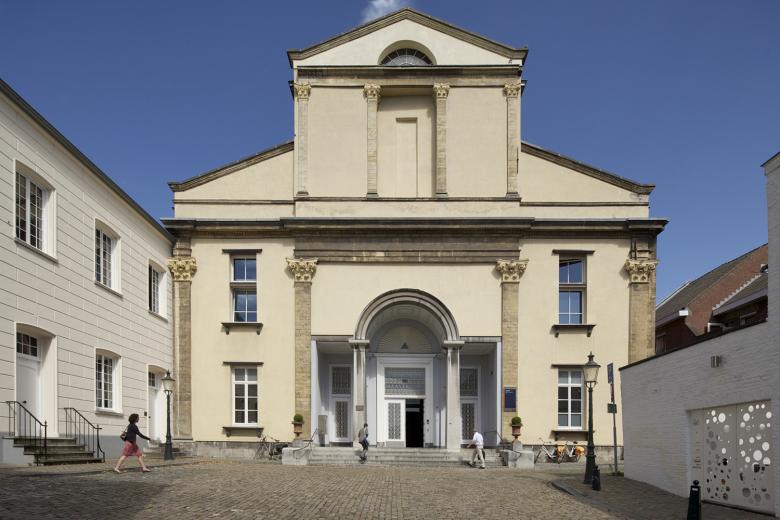Opportunities and concerns take centre stage during Minister Bruins' working visit to Maastricht
On Friday afternoon, 18 October, Minister Eppo Bruins (Education, Culture, and Science) paid a working visit to Maastricht. There, he was briefed by Limburg's educational institutions on current educational topics from the Education Manifesto. The minister also engaged in conversations with teachers and students. Through practical examples, Bruins gained a clear understanding of how education in Limburg is joining forces and taking advantage of the opportunities presented by its border location. In addition, the Province of Limburg and the educational institutions expressed their concerns about government plans that do not sufficiently take these regional opportunities into account.
The educational institutions in Limburg collaborate closely. Through the presentation of a joint Limburg Education Manifesto, they requested financial flexibility and stable, long-term funding from the government earlier this year. This is necessary to maintain the current range of educational programmes, despite the demographic decline.
Strengthening education
Appropriate regulations and an international outlook are essential to prevent an erosion of education in Limburg, maintain educational standards, and educate enough professionals for the tight labour market in the region and the Netherlands. Since 2022, Limburg has been among the top 40 innovative top European regions, according to the European Commission. To remain in this top group and seize new opportunities, strengthening education in the province is necessary. Limburg is asking for the space and measures needed to achieve this.
Customised solutions
It is therefore essential to develop customised policies for shrinking and border regions like Limburg within the proposed internationalisation policy. This flexibility is urgently needed. The province and educational institutions expressed their deep concern to the minister regarding his plans to drastically reduce the influx of international talent. Such a move could severely damage the positive developments Limburg has seen in recent years. "We live, work, and study in a unique environment, much of it surrounded by the borders with Belgium and Germany. It is therefore crucial to take advantage of the opportunities this offers. The chance to grow our border region into a strong and internationally competitive knowledge area is within reach. We, along with our government, must not miss this opportunity," said deputy Elianne Demollin-Schneiders (Education and Labour Market, Cross-border Policy).
A good balance in educating both Dutch and international talent is therefore important. In an international region like Limburg, with significant labour shortages across many sectors, the need for customised solutions is not only desirable but absolutely essential.
Continuing to attract talent
Minister Bruins added: "This cabinet is particularly attentive to the region, and today I visited one of the most beautiful regions of our country. I have seen wonderful collaborations in education that highlight Limburg’s strength as a border region. I see excellent initiatives to identify professions in South Limburg where shortages are expected. I believe it is important that we can continue to attract the talent we so urgently need, both from within and outside the region. My internationalisation policy therefore deliberately includes provisions for such customised solutions."
During the conversation with Minister Bruins, the educational parties also emphasised the need for an accessible, regional educational infrastructure. The minister was asked to consider the funding of education in relation to demographic decline, talent drain, and competition between regions.
Trinational education
Lastly, the minister focused on the possibilities for trinational education, leveraging the border as an opportunity for Limburg. Trinational education prepares students in the Meuse-Rhine Euregion for the Euregional labour market. Currently, the five universities in the Euregion are exploring the opportunities for such a trinational programme and the added value it would bring to the Euregion as a whole.
To conclude the working visit, Bruins, along with Professor Stefan Hild from Maastricht University, visited the ETpathfinder. This state-of-the-art physics laboratory serves as a testing ground for the development of the Einstein Telescope.
Also read
-
UM seeks new balance between the university and student associations
Maastricht University is suspending its relationship with student associations Tragos and Circumflex until further notice. Discussions with the boards of these associations have revealed that agreements outlined in the Code of Conduct have not been upheld. Experience from recent years shows that these...
-
Education minister's parliamentary letter: threat to education and region draws nearer
On 15 October, education minister Bruins informed the Netherlands House of Representatives of his plans to reduce the number of international students in the Netherlands through the Internationalisation in Balance Act (‘Wet Internationalisering in Balans’). Maastricht University has serious concerns...
-
Maastricht University student numbers stabilise
This year, the total number of students at Maastricht University will probably still increase slightly to more than 23,000. Due to an estimated 3% decrease in the number of new students, this growth will level off. The ratio of Dutch to international students is also stabilising: among the new cohort...